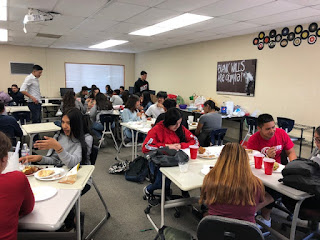- Briefly summarize the plot of the novel.
- Succinctly describe the theme of the novel. Avoid cliches.
- Based on the author's tone, describe how you imagine the author's morning routine. Does s/he get up early or sleep late? Coffee, tea, or no caffeine? Yoga/meditation/exercise? Groggily stumble to the toilet and wish s/he wasn't so hungover? Breakfast? If so, what kind of food? No, I am not kidding. There is no shortcut for this, only your own imaginative thinking based on how you read his/her work and interpret his/her tone. Include no fewer than three (3) excerpts from the text that illustrate your points.
- Describe five (5) literary techniques you observed that strengthened your understanding of the theme and/or your sense of the tone. These techniques may include characterization, figurative language, or anything else you've ever studied. If you can't come up with five, do your best to remember and then look up "literary techniques" online and see if something rings a bell. Include three (3) excerpts for each technique that will help your reader understand the technique and how it helped you gain insight.
Here are some more questions to guide your Literature Analyses for the rest of the year:
Reading is a relationship. Sometimes we get to the last page and feel wistful saying goodbye. Other times we find ourselves telling a book, "It's not you-- it's me. I just need some time apart, see other novels, get some space... "
1. What drew you to this book? What did you expect and/or hope to experience through reading it?
2. What kept you reading past the first ten pages?
3. Describe your reading habits
There are elements of literature that any well-read citizen is expected to know. If we can't identify and articulate an author's main idea (a.k.a. theme), for example, we are functionally illiterate. Sounding out words isn't reading.
1. Briefly summarize the plot of the novel you read, and explain how the narrative fulfills the author's purpose (based on your well-informed interpretation of same).
2. Succinctly describe the theme of the novel. Avoid cliches.
3. Describe the author's tone. Include a minimum of three excerpts that illustrate your point(s).
4. Describe a minimum of ten literary elements/techniques you observed that strengthened your understanding of the author's purpose, the text's theme and/or your sense of the tone. For each, please include textual support to help illustrate the point for your readers. (Please include edition and page numbers for easy reference.)
Characters aren't people, but they often provide the most compelling connection with a text.
1. Describe two examples of direct characterization and two examples of indirect characterization. Why does the author use both approaches, and to what end (i.e., what is your lasting impression of the character as a result)?
2. Does the author's syntax and/or diction change when s/he focuses on character? How? Example(s)?
3. Is the protagonist static or dynamic? Flat or round? Explain.
4. After reading the book did you come away feeling like you'd met a person or read a character? Analyze one textual example that illustrates your reaction.



If I stay
ReplyDelete